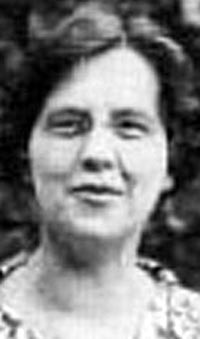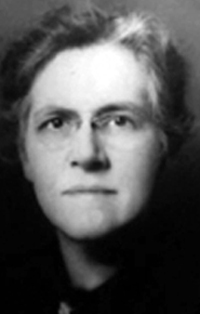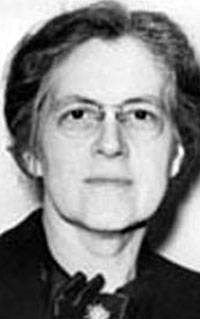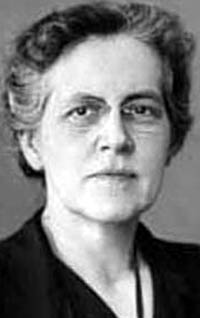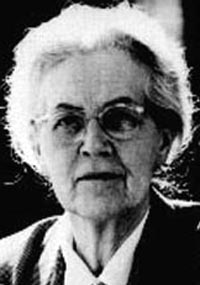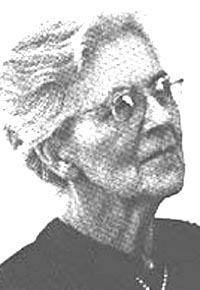Copyright Michael D. Robbins 2005
Astro-Rayological Interpretation & Charts
Quotes
Biography
Images & Physiognomic Interpretation
I’ve been a woman for a little over 50 years and have gotten over my initial astonishment. As for conducting an orchestra, that’s a job where I don’t think sex plays much part.
ATTRIBUTION: On becoming first woman to conduct Boston Symphony Orchestra, recalled on her death, International Herald Tribune 23 Oct 79A great work is made out of a combination of obedience and liberty.
Loving a child doesn’t mean giving in to all his whims; to love him is to bring out the best in him, to teach him to love what is difficult.
Life is denied by lack of attention, whether it be to cleaning windows or trying to write a masterpiece.
(Virgo Moon square Pluto & Neptune in Gemini.)Everything we know by heart enriches us and helps us find ourselves. If it should get in the way of finding ourselves, it is because we have no personality.
The essential [conditions] of everything you do … must be choice, love, passion.
(Saturn square Jupiter.)“Do not take up music unless you would rather die than not do so”
“The art of music is so deep and profound that to approach it very seriously only is not enough. One must approach music with a serious rigor and, at the same time, with a great, affectionate joy.”
(Saturn square Jupiter.)“Liberty has never come from the government. Liberty has always come from the subjects of it. The history of liberty is a history of resistance. The history of liberty is a history of limitations of governmental power, not the increase of it.”
The Constitution of the United States is not a mere lawyers' document; it is a vehicle of life, and its spirit is always the spirit of the age.
It is one thing to be gifted and quite another thing to be worthy of one's own gift.
To study music, we must learn the rules. To create music, we must forget them.
Attention is the state of mind which allows us to perceive what has to be
Nadia Boulanger (September 16, 1887 – October 22, 1979) was an influential composer, conductor, and music professor. She taught many of the most important composers and conductors of the 20th century.
Nadia Boulanger's grandmother was the singer Juliette Boulanger. Her grandfather, Frédérick Boulanger won first prize in violoncello in his fifth year (1797) at the recently founded Paris Conservatoire. Her father, Ernest Boulanger, later studied at the same conservatory (his teachers included Charles-Valentin Alkan), and won the Prix de Rome in 1835. He later taught there, where he met Nadia's mother, the Russian Princess, Raissa Myshetskaya.
Nadia Boulanger's emotional life was largely centered around her love for her sister, Lili Boulanger, who was six years younger. Lili was one of Nadia's first composition students, and it was largely under her guidance that Lili became the first woman ever to win the Prix de Rome, in 1913.
Nadia Boulanger entered the Paris Conservatoire at the age of ten. It was here that she studied organ with Alexandre Guilmant and later with Charles-Marie Widor. She also studied composition with Gabriel Fauré. After winning first prize in organ, accompaniment, and fugue, she won the Deuxième Grand Prix de Rome in 1908.
Boulanger, who liked to be known as 'Mademoiselle', was the first woman to conduct several major symphony orchestras, including the New York Philharmonic, the Boston Symphony, the Philadelphia Orchestra, and in England the Hallé Orchestra of Manchester and the BBC Symphony Orchestra.
Her first teaching position was at Alfred Cortot's École Normale de Musique de Paris, in 1916. After World War I (1921) she was appointed professor of Harmony at the American Conservatory of Music in Fontainebleau, where she was discovered by a new generation of American composers [see below.] She eventually became its director [1950]. She also taught at the Longy School of Music and the Paris Conservatory.
Many of her students from the 1920s, including Aaron Copland, Walter Piston, Roy Harris, and Virgil Thomson, established a new school of composition based on her teaching, and Walter Piston, in addition to his compositions, has produced three superb textbooks, on Harmony, Counterpoint and Orchestration. It used to be said that every town in America had its Boulanger pupil. Her influence was immense throughout most of the Western musical world.
Boulanger's teaching methods included traditional harmony, score reading at the piano, species counterpoint, analysis, and mastery of sight singing (using fixed-Do solfège). Her students were also expected to memorize Bach's Well-Tempered Clavier Books 1 and 2, and to learn to improvise fugues (as Bach often did). Her range was phenomenal, her ear perfect, her memory seemingly photographic, and her disciplinary demands absolute. Her whole character was imbued with passionate dedication, generosity, and intense love of life.
Here is an incomplete list of her musical students. Neither Boulanger nor Annette Dieudonné, her life-long friend and assistant, kept records of those students who studied with Boulanger. In addition, it is virtually impossible to determine the exact nature of an individual's private study with Boulanger.
These two sisters made an extraordinary impact on French musical life, Lili being the first woman to win the much coveted Prix de Rome, and Nadia becoming perhaps the most influencial musical teacher of the 20th century.
Nadia entered the Paris Conservatoire aged ten, and later studied with Faure. Her cantata La sirene won her second prize in the Prix de Rome in 1908. She was deeply affected by the death of her sister in 1918, and from 1919 was no longer active as a composer. She devoted her life to conducting and teaching; her pupils included Lennox Berkeley, Elliott Carter, Aaron Copland, Jean Francais, Thea Musgrave and Walter Piston.
Lili's precocious musical career was guided to begin with by Nadia. Her cantata Faust et Helene won the Prix de Rome in 1913, after which her achievements became headline news. Ill from the age of twelve, and fragile for the rest of her brief life, she composed a surprising amount of music. Above all her sensitive handling of large choral and orchestral forces continues to compel admiration.

